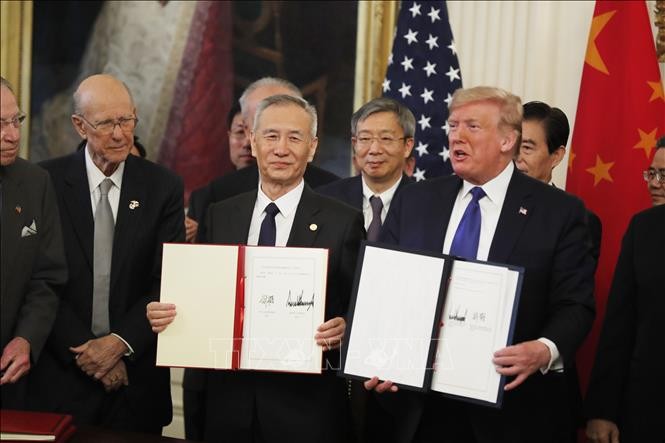(VOVWORLD) - The US and China signed their phase 1 trade deal on Wednesday after 18 months of tit-for-tat. The deal is sending a positive signal to the global financial market in the early months of 2020.
 US President Donald Trump and Chinese Vice Premier Liu He sign the first phase of a trade deal on January 15, in Washington, DC (Photo: Xinhua/VNA) US President Donald Trump and Chinese Vice Premier Liu He sign the first phase of a trade deal on January 15, in Washington, DC (Photo: Xinhua/VNA) |
Analysts say that although the agreement leaves many points of contention unresolved, it acknowledges efforts by the world’s two biggest economies to narrow their differences. Many predict this deal will make easier follow-up negotiations between the US and China.
Major points unresolved
Under the deal, China pledges to purchase American products and services worth at least 200 billion USD over the next two years. In return, the US will suspend tariffs that were scheduled to go into effect on December 15, 2019, on nearly 160 billion USD worth of Chinese goods.
But analysts remain skeptical about how productive this deal will be. First, the deal fails to address concerns over Chinese subsidies of state-owned firms, a key issue the US raised at the start of the trade war. Washington accused Beijing of protecting its essential industries to gain a competitive edge. Second, the agreement fails to fully eliminate tariffs that have slowed the global economy.
China took cautious stance on further developments after the agreement was signed. China’s Global Times was doubtful that trade relations will return to normal, saying “the US may play tricks with the pace of tariff roll-backs - first, less important tariff items, then, more significant ones.”
Analysts argue that the signing of the phase 1 trade deal is a modest de-escalation of confrontation between the two powers, but could end up making things worse.
Global financial markets surged on investor optimism over this deal. The Dow closed above 29,000 for the first time Wednesday. The S&P 500 also scaled new heights.
Thorny problems remain
The hard-earned agreement is obviously important for both China and the US for building trust between China and the US. But tensions over e-commerce, cyber security, Hong Kong, and the Islamic Community in China continue.